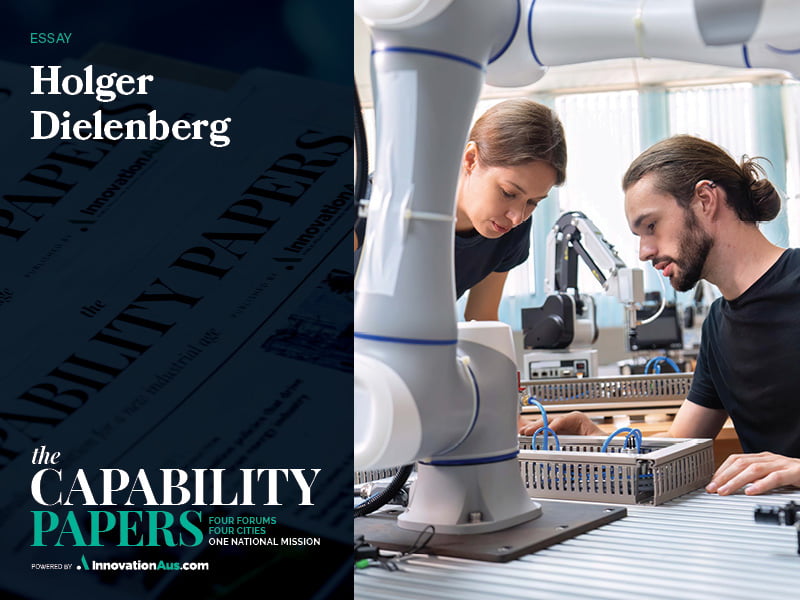Australia has the right legacy strengths, technological capabilities and skilled population to become a global innovation leader. However, support gaps at the grassroots are holding us back from reaching our full potential.
A network of capability platforms like business makerspaces along with a changed mindset can address this.
The government excels in supporting existing enterprises in their pursuit of innovation and we have initiatives within formal structures like universities and business incubators to support grassroots development. But despite this, we still lose many of our youngest and brightest innovators to more established overseas ecosystems.

The story of Dr Shi Zhengrong, an Australian solar scientist, highlights the consequences of neglecting grassroots innovation and investment in Australia. After developing solar panels at the University of New South Wales, Dr Shi sought better investment and production conditions in China.
At its peak, his Suntech empire was valued at US$16 billion and was headquartered in Wuxi in China, rather than Australia.
Australia’s inability to capture the full potential of technology, often nurtured in our excellent research facilities, is frustrating. Our struggle to foster innovation at the grassroots of manufacturing is usually justified through high cost of domestic labour and our geographic isolation – but these are old excuses.
We now have a better understanding for why Australian manufacturing startups struggle.
Part of the problem is that the government’s low risk tolerance and high eligibility thresholds for grant funding result in small to medium enterprises and digital-only software app startups getting a larger share of the funding pie, leaving manufacturing startups neglected.
Another problem is that universities and corporations rarely support innovators operating outside their formal structures, meaning good ideas are often suffocated by bureaucracy.
Even incubators, accelerators and co-working spaces, which are great contributors to Australian innovation, are generally not equipped to cater for manufacturing innovation.
Although Australia’s design and engineering expertise is world class and positions us as a technology leader, the lack of support in grassroots manufacturing creates an innovation gap.
Business makerspaces like Space Tank Studio provide a platform to bridge this gap by helping innovators bring their concepts from the prototyping bench to business. Over 10 years and a thousand startups, we have learned how to nurture manufacturing startups into iconic Australian brands, and to unlock the potential of advanced manufacturing through innovative product design.
Business makerspaces
Business makerspaces play an important role in the startup space. Like accelerators, incubators and universities, they help entrepreneurs grow.
Their point of difference is that they provide an inclusive, street level, walk-in space where technology and manufacturing resources are made available to founders to help them build physical product development businesses.
At Space Tank, for example, we do this by putting tech in the hands of next generation builders. By leveraging economies of scale across studio tenancy, technology and training services, we can offer affordable DIY access to a wide range of technology and equipment, including 3D printers, laser cutters, CNC machines, wood and metal workshops and co-working fabrication spaces.
Innovators can rent studio space or get casual day passes and once inducted on OH+S procedures, they can use any equipment they need to test concepts, create prototypes or begin small batch production runs.
Space Tank addresses skills and education gaps by providing tailored training courses and business networks. With a community of skilled professionals in engineering, design and entrepreneurship, Space Tank serves as a hub for mentorship and guidance, helping startups overcome technical challenges, refine product designs and develop scalable processes.
Through collaboration and skill sharing, startups can learn from each other, tap into networks of industry expertise and explore resource sharing initiatives.
We host events on relevant advanced manufacturing topics and invite presentations from successful manufacturing entrepreneurs to provide inspiration and share insider knowledge.
We also provide training to individuals of different abilities, making education more inclusive for those without formal qualifications or affiliations with universities or large companies.
In its 10 years, Space Tank has supported over 1,000 niche manufacturers and applied tech startups at the grassroots including Jaunt Motors (a global supplier of electric vehicle conversion kits) Bastion Cycles (world-first customisable carbon fibre and 3D printed titanium bicycles) and Cutthroat Knives (Australia’s most recognisable bespoke kitchen knives).
Other young innovators have worked on robotic 3D printing, drones combating mosquito-borne diseases, therapy orthotics, automated solar shades and micro satellite launch systems among others.
Crucially, however, business makerspaces provide a more accessible, individualised support than can be found anywhere else in Australia.
Enabling a wide range of talents from different disciplines to come together builds interdisciplinary networks and encourages mentorship, peer learning, and rapid idea-sharing. This leads to innovative solutions and more responsive skills development compared to bureaucratic processes found in universities and large corporations.
Members use what they need and give back to the community where they can. This immediate access to enabling resources and networking effect results in much faster iteration cycles than if they were burdened by bureaucratic processes found in universities and corporate incubators.
By offering safe, effective and scalable support for grassroots innovation, business makerspaces can help entrepreneurial manufacturers stay onshore.
Capability platforms
Capability platforms take advantage of technology through facilitating the interaction with people, process, and management. They provide the framework for networked relationships to embed learning into targeted problem areas.
By definition, they are a succinct explanation of how business makerspaces operate and why they can improve the state of Australian innovation.
A unified policy involving support for capability platforms and innovation programs can nurture thousands of young innovators into commercially ready enterprises.
Capability platforms like business makerspaces can be used to support the needs of independent grassroots innovators who are separated from formal structures like universities, companies and app-centric incubators.
This is a proven approach in Germany and America but needs to be tailored to meet Australia’s unique problems and opportunities.
Australia’s cohort of young innovators (comprising of digital natives, university graduates, designers, engineers, and entrepreneurs) possess tech-savviness, a hunger for change and a keen understanding of consumer needs and future trends.
Creating a national network of capability platforms to support them can produce much higher outcomes than backing SMEs alone. This is because investment in SMEs reaches a limit in terms of innovation outputs, technology transformation and employment.
In their efforts to scale-up, SMEs often try to capture all the value internally, diminishing shared economic outcomes. Using capability platforms to invest in young innovators directly leads to greater whole-of-sector development.
Business makerspaces offer a portfolio approach to fostering grassroots innovation. With minimal risk support, policies can be prototyped, allowing the government to implement small batch funding parcels to test initiatives and target industry weaknesses.
This nimble approach creates faster feedback loops for learning and iteration of policy design. Thus, helping government to discover the safest and most effective way of supporting grassroots innovation sectors and broaden innovation capacity across the whole startup ecosystem.
The adoption and development of such capability platforms, both for manufacturing and product services, will create ripple effects in technological innovation, job creation, export potential and industry transformation, driving overall technological progress and new market opportunities.
In the future, capability platforms like business makerspaces, will likely also have a role to play in helping government funders and investors prioritise support for startups with the highest potential for success.
An entrepreneurial mindset
Our mindset is critical to how we position innovation within an economic context. By shifting our mindset from primary industries to talent and ingenuity, Australia can transform from being a ‘lucky country’ to becoming a ‘smart country.’
To achieve a national innovation and entrepreneurial mindset, we need clear policies in place to support innovators from the ground up. This should include initiatives to support manufacturing innovators who operate outside formal structures and who lie below current funding thresholds.
The perception of manufacturing matters in relation to our innovation mindset. The Australian innovation ecosystem discriminates against manufacturing startups due to outdated perceptions of risk, slow speed to market, cost of goods and services and geographic isolation.
Although improvements in prototyping and advanced manufacturing technologies have made it faster and cheaper to produce physical products in Australia, it is true that manufacturers will not always fit the typical startup mould. They require tangible infrastructure and may scale at a slower pace than digital-only startups.
It is incumbent on government funders and investors to see past this and recognise the potential of great manufacturing startups or risk having them fall through the cracks or go offshore.
The media compounds invisibility for manufacturing startups. Advanced manufacturing stories are featured on platforms like Manufacturer’s Monthly, but they focus on SMEs. Startups are notably absent, reinforcing the notion that grassroots innovators are perceived differently.
Inclusive media messaging can change traditional perceptions. To tap into the potential of young innovators we need stories and language that resonates with them and encourages them to reclaim Australian Made.
Language, like ‘applied technology’ has surfaced within our innovation and design ecosystems. It refers to the merging of digital and manufacturing realms to create and commercialise physical technologies.
Applied technology symbolises creativity, speed, scalability and connectivity and is gaining momentum over the last five years.
By shifting towards ‘smart country’ economic policies, being more inclusive of manufactures in startup funding grants and showcasing applied technology entrepreneurs in media coverage, we can begin building a world class national innovation and entrepreneurial mindset.
In conclusion
Australia’s bias toward investing in SMEs and software apps is harming its innovation potential. Supporting innovation at the grassroots in Australia, particularly in manufacturing, will drive broad economic growth, fostering a culture of risk-taking and addressing regional disparities.
Capability platforms can filter and support our most promising grassroots innovation talent.
Business makerspaces play a vital role in supporting grassroots innovators and entrepreneurs who do not align with university, business and app-centric startup ecosystems.
By bridging skills gaps and providing inclusive access to affordable technology, capability platforms like business makerspaces are harnessing our young innovation potential and growing new iconic Australian Made innovations.
Investing in and supporting a national network of capability platforms like makerspaces can help lift our innovation index by leveraging Australia’s largest latent cohort of innovation talent.
Holger Dielenberg is Founder and Director of Space Tank Studio, Australia’s first independent and privately funded business makerspace and product development incubator for manufacturing startups. As a recognised leader in Victoria’s startup scene, Holger works closely with government, industry organisations, equipment suppliers and universities to develop better recognition and support for young innovators who operate outside of formal institutions.
Do you know more? Contact James Riley via Email.

